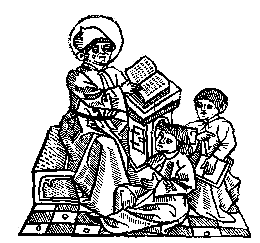The Canterbury Tales, a masterpiece of English Literature, written by Geoffrey Chaucer, is a collection, with frequent dramatic links, of 24 tales told to pass the time during a spring pilgrimage to the shrine of St. Thomas a Becket in Canterbury. The General Prologue introduces the pilgrims, 29 "sondry folk" gathered at the Tabard Inn in Southwark (outside of London). Chaucer decides to join them, taking some time to describe each pilgrim.
According to the Norton Anthology, "the composition of none of the tales can be accurately dated; most of them were written during the last fourteen years of Chaucer's life, although a few were probably written earlier and inserted into The Canterbury Tales" (Norton, 80).

One of the great characteristics of this story is the unique diversity of the characters illustrated by the author: "Chaucer's pilgrim narrators represent a wide spectrum of ranks and occupations. the great variety of tales is matched by the diversity of their tellers" (Norton, 79). Characters are well described so that they all together become an illustration of the culture, faith, and self definition that existed during the Middle Ages.
In the Knight, the reader is given the picture of a Middle English nobleman. He has fought in many wars, but is careful not to boast about his conquests. Clearly, the Knight is the most admired of the pilgrims, and not coincidentally, he tells his tale first.
The Squire is similar to the Knight in that he may one day become one, but he does not possess as many admirable qualities. Chaucer tells us that the Squire is an extremely vain individual, taking pains to improve his appearance.
The Yeoman is an assistant to Knight and Squire. We know very little about him from the story, except that he shoots the bow and arrow well. The Yeoman does not tell a tale.
The Prioress, Madame Eglantine, is a character full of denial. Though she is a nun whose duties should be pledged to God, she certainly considers herself a lady first. She speaks bad French, ate and dressed very carefully, and wears a brooch that says "love conquers all." She also cares deeply for animals, bringing several along with her on the pilgrimage. Her lady-like behavior seems to stand in direct contrast to the ways of a good Nun. This is Chaucer's first criticism of religion, a theme he returns to throughout the poem.
Like the Prioress, the Monk is also an ironic characterization. The Monk loved to ride horses and hunt. He also eats well and dresses in nice clothes. He even goes so far as to say that he prefers the outdoor life, hardly a statement one would expect from one whose profession entails sitting inside and copying books.
The Friar is a bad guy. He is licensed to hear confessions and uses his position to beg for money, operating under the assumption that penance works better through payment than prayers. He also has the reputation of getting girls into "trouble," then helping to marry them to others

The Merchant knows a good bargain when he sees it. His very smooth behavior helps hide the fact that he is really in debt.
The Clerk is soft-spoken student of the thetoric arts. When he speaks, it is with such expression that people readily listen. He is one of the most admired pilgrims.
The Man of Law is a careful attorney who can recite seemingly any judgment to the letter. His abilities earned him high popularity among others.
One of the most popular of the pilgrims is the Franklin, a guy who never finds a party he does not like. Although he is not of nobility, he owns enough land to enjoy the fruits of life, and he never stops to share them with others.
The Cook knows how to prepare the finest food, One of his best dishes is creamed chicken pie.
The Shipman is a very large man who spends his life on the water. Though he knows about every port in the Mediterranean, he looks awkward sitting on a horse.
The Physician knows everything about medicine, but seems to know little about the Bible. He apparently makes a lot of money during the plauge, but never appears to spend any of it.
Married five time over, the Wife of Bath knows everything there is too know about the ways of love. She appears to use these trips to meet guys.
The Parson is a shining example of what a religious person should be. A poor man, he prefers to give money he has to others.
The Plowman is a simple, honest farmer who lives in peace and pays his dues to the church. He doesn't tell any tale in the Chaucer's poem.
The Miller is a thick-shouldered man who can wrestle with the best. A large wart on his nose only serves to strengthen his imposing appearance.
The Manciple works at a law school, where he is in charge of feeding the prospective lawyers. He is not as smart as the students, yet he is a shrwed enough buyer to put away some money for himself.
The Reeve is a short-tempered, skinny man who manages an estate.
The Summoner is an ugly servant of the church court. Though he is paid to bring sinners to court, he quickly accepts bribes to look the other way. He enjoys women of "questionable reputation" and lots of wine, occasionally spouting off some Latin after indulging himself.
The most corrupt of the churchmen, the Pardoner sells pardons for sins to the highest bidder. Beardless with a high-pitched voice, he is referred to by Chaucer as "a gelding or a mare."